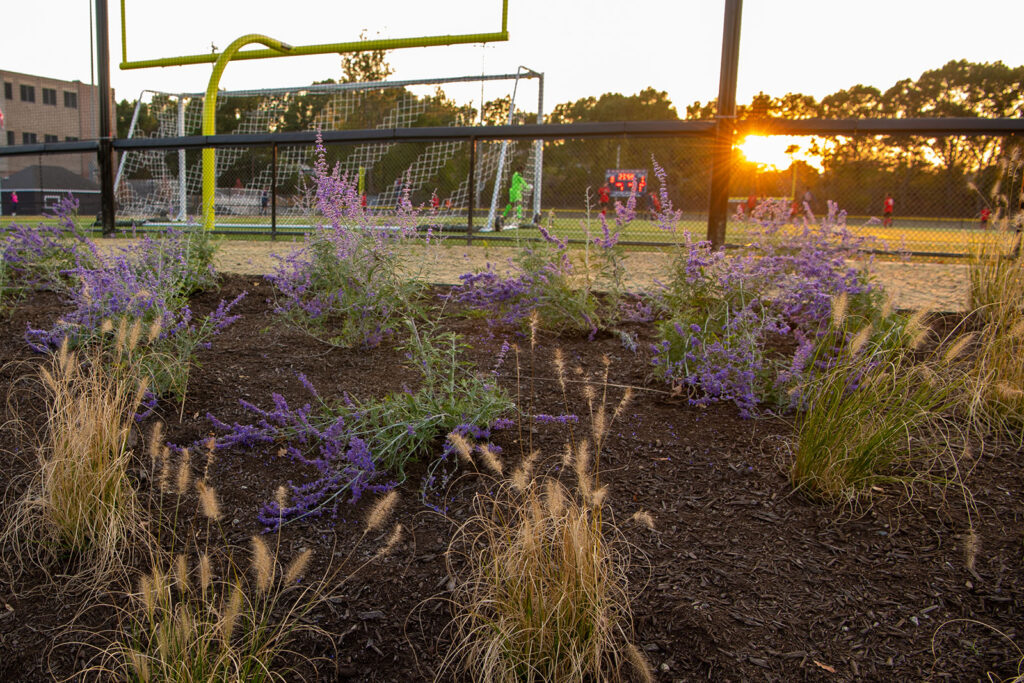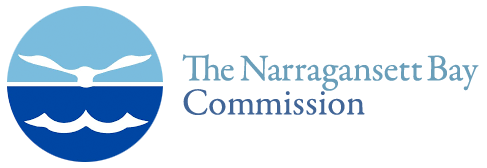
What is Stormwater?
When rain water flows down a street or from a parking lot, have you ever thought about where it goes? Or what is in that water? In our cities there is very little grassed area to soak up the rain, so this water flows over the ground and mixes with oil, grease and automotive fluids from pavement, fertilizer and pesticides from gardens, bacteria from pet waste, sand and soil from construction sites, soap from car washing, sewage from failed septic systems, and other debris and litter found in the streets. This polluted water then flows into storm drains or directly to our local water bodies and ultimately to Narragansett Bay.
Why is it a problem?
Once the polluted stormwater enters the local water bodies and the Bay, it threatens swimming beaches and fishing grounds.
What about the Narragansett Bay Commission’s collection system?
If the stormwater goes to a storm drain it enters the NBC combined sewer system. The pipes in the system lead either to the wastewater treatment plant at Field’s Point in Providence or Bucklin Point in East Providence. This water is then cleaned before entering the Bay. But if the pipes are overwhelmed from a heavy rain, then it enters the rivers and Bay directly. As a result, beaches and fishing grounds may be closed.
What is the solution?
The solution is to eliminate or significantly reduce the amount of stormwater entering into the NBC combined system, that as much sewage as possible makes its way to the Field’s Point and Bucklin Point facilities. In order to achieve this goal of reducing the amount of stormwater entering the sewer system, the NBC instituted a Stormwater Mitigation Program in 2003, which provides guidelines for home and business owners on managing the stormwater on their property.
Federal Regulations
The National Pollutant Discharge Elimination System (NPDES) Phase I Stormwater Program was initiated in 1990 by the U.S. Environmental Protection Agency (USEPA) to help minimize environmental impacts associated with stormwater discharges from large construction sites, large Municipal Separate Stormwater Sewers (MS4s), and certain industrial activities through the use of approved stormwater permits and stormwater management programs. In 1999, the Phase II Stormwater Program extended these requirements to a variety of smaller sources of stormwater runoff. The USEPA program was introduced because pollutants in stormwater runoff often include trace amounts of heavy metals, organic compounds, nutrients and suspended solids which all impact water quality and have the potential to affect biological activity in receiving waters.
State Regulations
The R.I. Department of Environmental Management (RIDEM) is the delegated authority for implementing the NPDES program in Rhode Island (referred to as RIPDES). The main purpose of the RIPDES program regulations are “to restore, preserve, and enhance the quality of the surface waters and to protect the waters from discharges of pollutants so that the waters shall be available for beneficial uses and thus protect the public health, welfare and the environment.” All stormwater from “Phase I and Phase II” sources that enter MS4s or that discharge directly to a Rhode Island water body are regulated by the RIDEM. Information can be found at: http://www.dem.ri.gov/programs/benviron/water/permits/ripdes/stwater/index.htm
NBC Stormwater Rules & Regulations
The Narragansett Bay Commission’s (NBC) sewer system was originally designed to treat sanitary wastewater. The NBC regulates not only sewage waste water but also any stormwater that enters the NBC’s combined sewer system. As a means of avoiding untreated overflows or increased hydraulic loadings from entering the treatment plants caused by stormwater, the NBC has established specific Rules & Regulations for the managing stormwater flow.
Under Article 4.4 of the NBC Rules and Regulations, developers may be required at their cost to prepare, submit and implement Stormwater Mitigation Plans that significantly reduce or ultimately eliminate stormwater from entering the NBC’s sanitary sewer system. The NBC encourages the use of Best Management Practices (BMPs) and Low Impact Design (LID) to minimize storm water impacts, especially when new or post construction development activities take place. If there are no other reasonable means of stormwater disposal available, the NBC may permit a stormwater connection to the NBC’s combined sewer system. Prior to connecting or discharging to the NBC’s public sewer system, prior approval for a sewer and/or stormwater connection permit must be obtained from the NBC.
NBC’s Stormwater Mitigation Programs
NBC’s Stormwater Mitigation Program was designed to deal with the large amounts of stormwater runoff that enters the NBC’s sanitary sewer system during large rain events. All of the excess stormwater increases the hydraulic capacity to the NBC’s Wastewater Treatment Facilities, affecting treatment efficiency and oftentimes causing untreated wastewater to be discharged through Combined Sewer Overflows (CSO) directly into the urban rivers and Narragansett Bay.
The NBC’s Rules and Regulations require all builders of new projects to develop a Stormwater Management Plan (SMP) with the ultimate objective of retaining most or all stormwater on the project site.
Article 4.4 of the NBC’s Rules & Regulations states that no person shall make any connection or shed any stormwater flows to the public sewer system unless the NBC determines that this connection is the only reasonable means available and this connection must also receive the NBC’s approval. This regulation states that the applicant must bear the cost of developing and submitting a SMP to the NBC.
Since the implementation of the NBC Stormwater Mitigation Program in 2003, developers and property owners have used environmentally friendly stormwater abatement technologies and mitigation strategies that reduce by over 8 million gallons the amount of stormwater entering the NBC sewage system during a three-month storm event (1.65ʺ/6 hours). This achievement creates additional capacity in the 66 million-gallon CSO tunnel (on-line since November 2008) and allows for collection of combined sewage overflows that would otherwise flow directly into the rivers and upper Narragansett Bay.
The NBC Stormwater Mitigation Program can be replicated easily by any regulatory agency seeking to reduce permitted stormwater flows directly into a sewage system or receiving water. The greatest success of the Program has come from changing the way local developers think about and approach stormwater disposal within the ten cities and towns serviced by the NBC.
For more information about stormwater mitigation, please see these documents:
